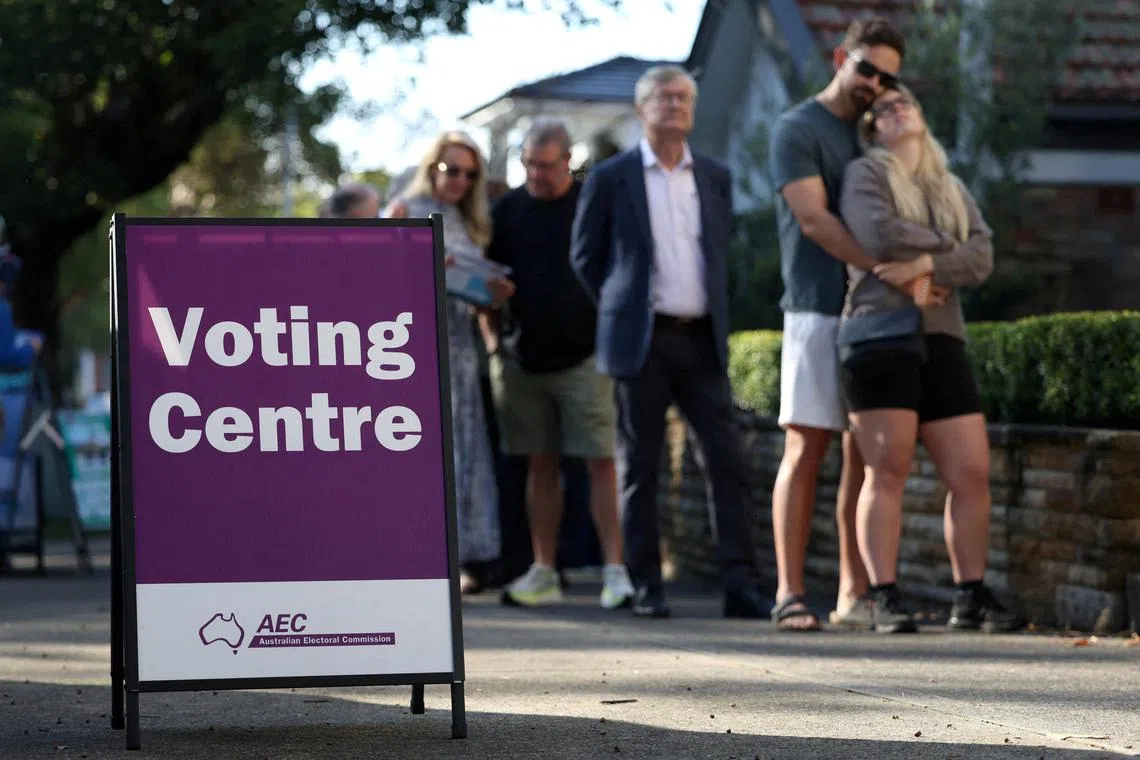Australia’s prime minister, opposition make final election pitch under Trump shadow
Sign up now: Get insights on Asia's fast-moving developments

Close to seven million out of an eligible 18 million voters had already cast a ballot by May 2 at early voting centres or by postal voting.
PHOTO: REUTERS
Follow topic:
SYDNEY – Australian Prime Minister Anthony Albanese campaigned in his conservative opponent Peter Dutton's constituency on the final day before the May 3 election, with polls favouring the incumbent in a campaign overshadowed by US President Donald Trump's volatile diplomacy.
Australia is among the few democracies with mandatory voting, and close to seven million out of an eligible 18 million voters had already cast a ballot by May 2 at early voting centres or by postal voting, the Australian Electoral Commission said.
All published opinion polls show Mr Albanese’s centre-left Labor ahead of the conservative Liberal-National Coalition on a two-party preferred basis, although the polls also show that Labor could find itself leading a minority government.
Both major parties have focused on cost-of-living pressures and high housing costs, but polls show that global uncertainty driven by Mr Trump's stop-start tariffs rapidly became a top issue for voters during the campaign.
Mr Dutton has sought to distance himself from comparisons with Mr Trump but has fallen behind after leading in opinion polls as recently as February.
Political strategists said Mr Trump was not the decisive factor – Mr Albanese has run a strong campaign, and Mr Dutton made mistakes, including a short-lived policy to ban public servants working from home.
But the Trump effect, they said, has added to reservations for voters who became risk-averse.
“In uncertain times you can be certain that Labor has a plan to build Australia’s future, and you can be certain that the coalition have cuts and chaos,” Mr Albanese said on May 2 at a press conference, honing his final pitch to voters.
In a radio interview with the Australian Broadcasting Corporation, Mr Albanese said Australia was “a different country to the United States” and voters are concerned about Mr Dutton’s election pledges to “slash climate change policies” and cut 41,000 public servants.
Mr Dutton, campaigning in his own electorate a day before Mr Albanese, highlighted difficulties facing Australian families and small businesses.
“Are you better off today than you were three years ago?” he told voters.
Pointing to a 2019 election result that had defied the opinion polls by returning a conservative government, Mr Dutton said on May 2 he could still win.
A RedBridge-Accent poll published by News Corp newspapers on May 1 showed Labor leading 53 per cent - 47 per cent
An Australian Financial Review/Freshwater poll on May 2 had Labor leading 51.5 per cent - 48.5 per cent.
Mr Albanese, who flew 1,600km from Queensland in the north to the southernmost state of Tasmania, cautioned that there were a large number of undecided voters.
He will proceed to Victoria, where analysts said Labor is at risk of losing outer suburban seats, and to his home state of New South Wales.
Mr Albanese said on May 2 he would not strike policy deals for support from minor parties or independents, as occurred in the most recent minority Labor government in 2010. REUTERS

